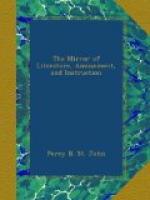Newgate, March 3, 1784.
My Dear Sir,—Before this reaches you, the head that dictates and the hand that traces these lines shall be no more. Earthly cares shall all be swallowed up, and the death of an unthinking man shall have atoned for the trespass he has committed against the laws of his country. But ere the curtain be for ever dropped, or remembrance leave this tortured breast, let me take this last and solemn leave of one with whom I have passed so many social and instructive hours, whose conversation I fondly cultivated, and whose friendship for me I hope will remain, even after the clay-cold hand of death has closed my eyes in everlasting darkness.
I cannot think you will view this letter with stoic coolness, or with listless indifference. Absorbed as the generality of men are in the pursuits of pleasure or the avocations of business, there are times when the mind looks inward upon itself, when a review of past follies induces us to future amendment, and when a consciousness of having acted wrong leads us to resolutions of doing right. In one of those fortunate moments may you receive these last admonitions! Shun but the rock on which I have struck, and you will be sure to avoid the shipwreck I have suffered. Initiated in the army at an early period of life, I soon anticipated not only the follies, but even the vices of my companions. Before, however, I could share with undisturbed repose in the wickedness of others, it was necessary to remove from myself what the infidel terms the prejudices of a Christian education. In this I unfortunately succeeded; and conceiving from my tenderest years a taste for reading, my sentiments were confirmed, not by the flimsy effusions of empty libertines, but by the specious sophistry of modern philosophers. It must be owned that at first I was rather pleased with the elegance of their language than the force of their reasoning; as, however, we are apt to believe what we eagerly wish to be true, in a short time I soon became a professed deist. My favourite author was the late celebrated David Hume. I constantly urged his exemplary behaviour in private as a strong argument in favour of his doctrines, forgetting that his literary life was uniformly employed in diffusing his pernicious tenets, and his utmost endeavours were constantly exerted in extending the baneful influence of his philosophical principles. Happy for me had I always been actuated by the considerations which fill my bosom at this moment, and which I hope will animate me in that awful part to-morrow’s sun shall see me perform. But the die is cast, and I leave to the world this mournful memento, “that however much a man may be favoured by personal qualifications, or distinguished by mental endowments, genius will be useless, and abilities avail but little, unless accompanied by a sense of religion, and attended by the practice of virtue; destitute of these, he will only be mounted on the wings of folly, that he may fall with greater force into the dark abyss of endless despair.”




